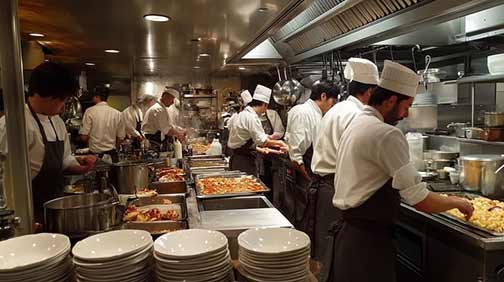
Grease traps are an important fixture in food establishments in the commercial sector, specially designed to intercept fats, oils, and grease (FOG) before they seep through the wastewater system. Grease traps are essential in avoiding clogging and contamination and maintaining compliance with strict local regulations. Regular maintenance of functioning grease trap systems is as important as it can be because they directly influence the operational efficiency, safety, and sustainability of kitchen operations. An immaculately maintained grease trap not only safeguards the plumbing system but also upholds the standing of the kitchen as clean and green.
Identifying Common Challenges in Grease Trap Management
Grease trap operations in high-volume commercial kitchens are fraught with a host of problems. Clogging, odors, and inefficient grease separation are among the most prevalent. Clogging typically occurs due to inadequate maintenance or due to an over-build-up of FOG, leading to costly plumbing and even operational closure. Odors can permeate the kitchen environment if grease traps are not regularly cleaned, compromising ambiance and sanitation standards. Additionally, poor grease separation can lead to failure in meeting environmental compliance, which is a great risk to the business reputation and sustainability targets.
Implementing Effective Solutions for Grease Trap Maintenance
To counteract these problems, instituting sound solutions to grease trap maintenance is necessary. Regular cleaning and maintenance schedules guarantee maximum efficiency and avert blockages. Using enzyme-based cleaners may break down grease more effectively, limiting clog and odor risks. Further, making purchases of high-grade grease trap systems with advanced separation technologies can boost efficiency and compliance markedly. Employee training in good grease disposal habits and the upkeep of regular maintenance is also crucial in maintaining a clean kitchen. Through establishing a culture of preventive maintenance and professional grease trap cleaning, commercial kitchens may eliminate downtime as well as inefficiency in operations.
Ensuring Compliance with Stringent Environmental Regulations
Environmental regulation compliance is a fundamental aspect of grease trap management. Commercial kitchens must adhere to local laws regarding disposal of FOG to avoid fines and environmental damage. Keeping up with changes in the regulation and applying best practice grease management will enable kitchens to remain compliant. Regular inspection and audit can help tackle potential compliance issues in advance, safeguarding the operations and reputation of the business. By prioritizing compliance, commercial kitchens can demonstrate their commitment to environmental stewardship and community stewardship.
Exploring Innovative Technologies in Grease Trap Systems
Technological advances in grease traps offer commercial kitchens new options. Modern systems offer features such as automatic cleaning, real-time monitoring, and improved grease separation processes. They make the process more efficient, reduce labor, and provide valuable data for improving maintenance scheduling. An investment in advanced grease trap systems can create cost savings in the long run and improve sustainability, making them a worthwhile investment for any commercial kitchen. By adopting innovation, the kitchens can streamline procedures, reduce the environmental impact, and enhance overall efficiency.

The Pivotal Role of Staff Training in Grease Management
Training of staff is an important component of effective grease management. Training of kitchen staff to dispose of grease and undertake maintenance activities correctly ensures the best possible performance of grease traps. Proper practices of FOG disposal, the implications of neglecting grease traps, and methods to diagnose impending problems early should also be addressed in training programs. Providing knowledge and skills to staff will promote active management of grease, minimizing risk and optimizing kitchen efficiency. Commercial kitchen staff training paid for by businesses can create a culture of excellence and accountability in grease management.
Case Studies: Examining Successful Grease Trap Solutions
Case studies of successful grease trap solutions provide insight into valuable lessons on effective management. The majority of commercial kitchens have implemented well-rounded grease management plans encompassing frequent maintenance, employee training, and high-technology systems. The case studies show the benefits of visionary grease trap management, including reduced downtime, compliance with laws, and increased kitchen cleanliness. Drawing from these examples, other companies can learn how to develop their own effective grease management. Observing successes in real-world operations, kitchens can take effective strategies and apply them to improving their own practice.
Future Trends in Grease Trap Management: Embracing Innovation
The future of managing grease traps will change with emerging trends and technologies. More focus will be on sustainability and environmental issues, which will shape the evolution of grease trap systems into more efficient and eco-friendly ones. Automation and smart technologies will take center stage, providing real-time information and analysis for greases management optimization. Staying ahead of these trends will enable commercial kitchens to adapt and thrive in a constantly shifting world, encouraging continued compliance and operational excellence. By seeing into the future of coming trends, kitchens can be at the forefront of industry advance.
Conclusion: Achieving Excellence in Grease Trap Management
Maintaining excellence in grease trap management requires an integrated approach that includes overcoming challenges, implementing effective solutions, and embracing new technologies. By giving highest priority to frequent maintenance, regulation compliance, and investment in personnel training, commercial kitchens can overcome grease trap challenges and maintain efficient and sustainable operations. As the industry evolves, staying current with emerging trends and adopting innovative solutions will be essential to ensuring compliance and upholding long-term success. By adopting excellence in grease management, commercial kitchens can safeguard their operations and make a positive impact on the environment.

